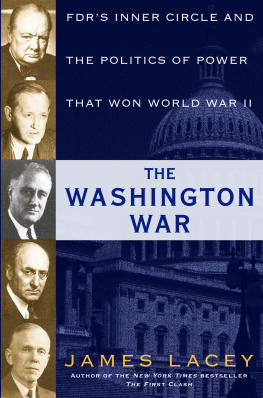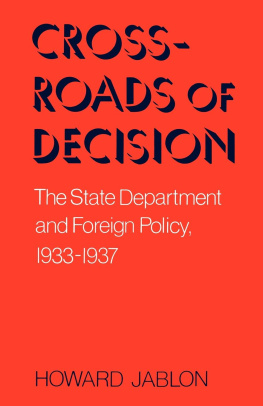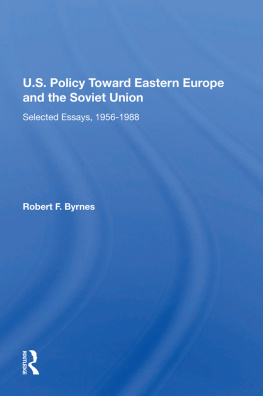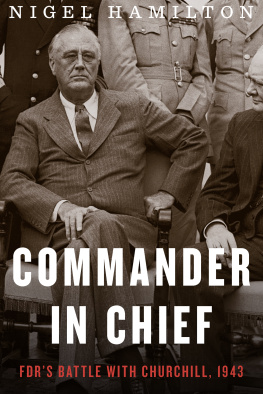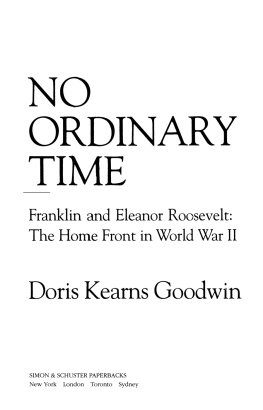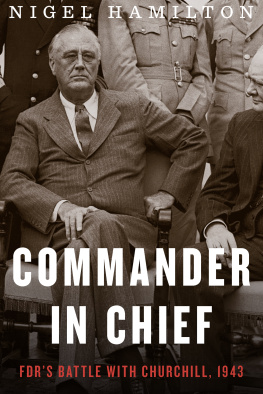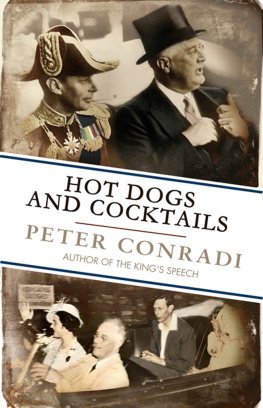Contents
Landmarks
Print Page List
The Washington War is a work of nonfiction. Some names and identifying details have been changed.
Copyright 2019 by James Lacey
All rights reserved.
Published in the United States by Bantam Books, an imprint of Random House, a division of Penguin Random House LLC, New York.
B ANTAM B OOKS and the H OUSE colophon are registered trademarks of Penguin Random House LLC.
LIBRARY OF CONGRESS CATALOGING-IN-PUBLICATION DATA
Names: Lacey, Jim, author.
Title: The Washington war : FDRs inner circle and the politics of power that won World War II / James Lacey.
Description: First edition. | New York : Bantam Books, [2019] | Includes bibliographical references and index.
Identifiers: LCCN 2018053679| ISBN 9780345547583 (hardcover) | ISBN 9780345547590 (ebook)
Subjects: LCSH: Roosevelt, Franklin D. (Franklin Delano), 18821945. | Roosevelt, Franklin D. (Franklin Delano), 18821945Military leadership. | Roosevelt, Franklin D. (Franklin Delano), 18821945Friends and associates. | Cabinet officersUnited States. | Marshall, George C. (George Catlett), 18801959. | Morgenthau, Henry, 18911967. | Stimson, Henry L. (Henry Lewis), 18671950. | Byrnes, James F. (James Francis), 18821972. | King, Ernest Joseph, 18781956. | Hopkins, Harry L. (Harry Lloyd), 18901946. | World War, 19391945United States. | United StatesPolitics and government19331945.
Classification: LCC E806 .L24 2019 | DDC 973.917092dc23
LC record available at https://lccn.loc.gov/2018053679
Ebook ISBN9780345547590
randomhousebooks.com
Book design by Virginia Norey, adapted for ebook
Cover design: Carlos Beltrn
Cover photos: Winston Churchill by Yousuf Karsh, Library and Archives Canada; Harry Hopkins by Margaret Bourke-White/Getty Images; Franklin Delano Roosevelt by Elias Goldensky/Library of Congress; Secretary of State Henry Morgenthau, Jr. by Getty Images; George Marshall by Bachrach/Getty Images
v5.4_r1
ep
Contents
T HE W ASHINGTON W ARRIORS
Henry Harley Hap Arnold Chief of staff of the Air Force and the driving force behind the creation of the great air armadas that bombed Germany and France into submission. His idea of getting things done was to tell someone to do it, and he ensured long-term success by making sure no one ever stayed around to disappoint him twice.
Bernard Baruch A self-made multimillionaire, he had been the production czar during the mobilization for World War I and expected to get the call again. It never came. Roosevelt liked Baruch, and valued his advice, but Hopkins, who saw him as a threat to his own power, always kept him at arms length. Baruch spent most of the war offering valuable advice to whoever came calling.
Alan Brooke A British field marshal and chief of the Imperial General Staff. Brooke had three enemies during the war: Churchill, Marshall, and the Axis powers. His barely concealed disdain for the military capacity of the first two sometimes got in the way of defeating the third.
William C. Bullitt, Jr. The most brilliant graduate of Yales 1912 class, he wasted his talent on petty jealousies and revenge plots. He was the first U.S. ambassador to the Soviet Union, and at the start of the war the ambassador to France. He always judged himself as ready to play at the highest levels and certainly saw himself as FDRs wartime secretary of state, a job he coveted.
James F. Jimmy Byrnes For years he was the presidents go-to man in the Senate. If there was something important to get through the Senate, FDR handed the job to Byrnes, whose technique, a combination of iron fist and velvet glove, shepherded through many difficult legislative proposals. In midwar he was brought to the White House, where he quickly established himself as the assistant president and took over running the country.
Neville Chamberlain British prime minister at the wars onset. Upon returning from the Munich talks with Hitler, he had famously promised peace in our time, to which Churchill retorted, The government had a choice between shame and war. It chose shame; it will get war.
Winston Churchill British prime minister throughout most of the war. He was moody, argumentative, and often difficult to bear, and he drank too much, but, in Britains darkest hour, he was the indispensable man.
Grenville Clark As a confidant to presidents, Clark was the master of wielding power from behind the scenes, mobilizing both the Republican and Democratic establishments to an overriding cause: winning two world wars.
Father Charles Coughlin A bigoted, anti-Semitic priest who went from being an early Roosevelt supporter to railing against everything FDR stood for. His support of Hitler, Mussolini, and Hirohito finally caused the cancellation of his nationally syndicated radio show in 1939.
Charles de Gaulle The leader of the Free French, and a thorn in both Churchills and Roosevelts sides throughout the war. Through arrogance and force of will he played a weak military, political, and diplomatic hand with consummate skill.
Thomas Dewey As a district attorney in New York City and governor of New York State, he waged a relentless war against organized crime. But when he ran against FDR in 1944, he proved no match for the Champ.
John Dill A British field marshal and former chief of the Imperial Staff. After a falling-out with Churchill he was sent to the United States as a liaison to the American Joint Chiefs. He became a close friend to General Marshall, and did yeomans service explaining the Americans to the British and the British to the Americans.
Ferdinand Eberstadt Covice chairman of the War Production Board (WPB), he almost single-handedly brought order out of chaos in the allocation of scarce raw materials. Unfortunately, he was a neophyte in the ways of Washingtona fatal weakness in the ensuing power struggles.
Dwight Eisenhower He began the war as General Marshalls chief planner and ended as the supreme Allied commander in Europe.
Felix Frankfurter A Supreme Court justice and Roosevelt administration talent scout. His acolytes populated almost all the rungs of government just below the secretary level, and were commonly referred to as Felixs Happy Hot Dogs.
John Nance Garner As vice president for Roosevelts first two terms, he famously observed that the vice presidency is not worth a bucket of warm spit. (He really said warm piss.)
Leon Henderson A man without friends or the desire to make any. When there was a dirty and unpopular job to be done, it went to the always bellicose Henderson. During the war he was tasked with keeping inflation in check through the Office of Price Administration, where he accumulated enemies while almost single-handedly turning the tide of some of the most vicious Washington disputes.
Sidney Hillman A full-time labor leader, part-time communist, and the man Roosevelt kept on every production organization as a foil to the more belligerent labor titan John L. Lewis.
Harry Hopkins By living in the White House, Hopkins became Roosevelts most powerful and trusted adviser. He was hugely capable, but just as hugely insecure and protective of his influence and position.
Cordell Hull As secretary of state he was rarely able to get beyond the picayune and rise to the level of wartime consigliere, a role he coveted. Hull was the perfect secretary for a stable world but was unable to cope with a world in crisis.

